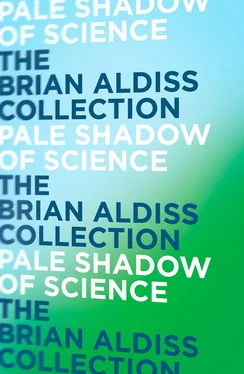Brian Aldiss - Pale Shadow of Science
Здесь есть возможность читать онлайн «Brian Aldiss - Pale Shadow of Science» — ознакомительный отрывок электронной книги совершенно бесплатно, а после прочтения отрывка купить полную версию. В некоторых случаях можно слушать аудио, скачать через торрент в формате fb2 и присутствует краткое содержание. Жанр: unrecognised, на английском языке. Описание произведения, (предисловие) а так же отзывы посетителей доступны на портале библиотеки ЛибКат.
- Название:Pale Shadow of Science
- Автор:
- Жанр:
- Год:неизвестен
- ISBN:нет данных
- Рейтинг книги:5 / 5. Голосов: 1
-
Избранное:Добавить в избранное
- Отзывы:
-
Ваша оценка:
- 100
- 1
- 2
- 3
- 4
- 5
Pale Shadow of Science: краткое содержание, описание и аннотация
Предлагаем к чтению аннотацию, описание, краткое содержание или предисловие (зависит от того, что написал сам автор книги «Pale Shadow of Science»). Если вы не нашли необходимую информацию о книге — напишите в комментариях, мы постараемся отыскать её.
Pale Shadow of Science — читать онлайн ознакомительный отрывок
Ниже представлен текст книги, разбитый по страницам. Система сохранения места последней прочитанной страницы, позволяет с удобством читать онлайн бесплатно книгу «Pale Shadow of Science», без необходимости каждый раз заново искать на чём Вы остановились. Поставьте закладку, и сможете в любой момент перейти на страницу, на которой закончили чтение.
Интервал:
Закладка:
We tilled our strips and sowed them before the spring holidays. When we returned for the summer term, there among the weeds would be thin lines of lettuce, carrot, radish, and spring onion. These lines we tended with care. They were our food. We used them to eke out the meagre rations provided. And we ate, or at least bit into, the green apples on the trees.
The unripe apples provided useful ammunition, along with stones, in our wars against the local lads. The local lads hated us, and made the life of the dozen prisoners of St Paul’s as hazardous as they could. They would creep along the footpath which ran behind the field, to launch a stone barrage as we pottered about our garden strips. We fought back. We aimed to kill. When one of us was hit, we hushed it up and made excuses for any visible gashes.
Sunday was the day when the local lads triumphed, when our humiliation was greatest. For the fool Fangby, impelled to destruction by some folk-myth of decent schools which he had never seen, made his boarders dress in Sunday best. This meant black pinstripe trousers, black jackets, ties, and Eton collars. Eton collars are wide and stiff, permitting the wearer about as much freedom and comfort as an ox gets from a yoke. In this loathed outfit, and with the addition of straw boaters, the twelve of us were made to march in crocodile five miles to Mundesley Church for the morning service.
What a raree-show for the local lads. In their hobnails, cords, collarless shirts and braces, they would turn up to laugh and trip or kick us as we passed. It was a relief to arrive at the church.
Our hero for a few weeks was Legge. As we were passing the village pond, he managed to skim his boater into the middle of the duckweed. To get it out, we broke ranks and all became desirably muddied almost to the knee. In that state, we became less of a free advertisement for Mr Fangby’s menagerie.
I liked church. I had fallen in love with the local policeman’s daughter. We smiled at each other across the intervening pews. In her smile was forgiveness for the whole world of Eton collars.
In that church, gazing at the beautiful stained glass windows, I experienced the first of my eternal moments. Everyone was singing, and the policeman’s daughter was at the outer end of the pew on the opposite side of the aisle, so that we could exchange looks. Carried away by everything, I was filled with an oceanic feeling of happiness. ‘I will remember this moment all my life,’ I said to myself. And I have.
The picture of that moment returns easily. I can see the organ, the timbered roof, the choir, the stained glass. The view is an elevated one. The eternal part of me which took the snapshot was floating about twenty feet above my head.
The vicar’s name was Winterton. He had two sons, who came to St Paul’s at reduced rates. They were badly bullied at first. We chased them round and round the field and eventually buried them head first in a huge pile of grass clippings. Next term, they returned with avenging fury. Their father had been talking to them. Both were small. But they set upon us with sticks and terrified us. From then on, they drove us round the field at whim.
While the garden was one consolation, the library was another. Library was the name of the bookshelves behind the door of our classroom – it was more than a classroom, being the room in which we were trapped when we were not in the dormitory or exiled to the field. The misery of being back in that room for another term was stifled by being able to pick out The Captives of the Sea (or was it The Prisoners of the Sea ?) and commence a re-reading. The story was sub-Dumas. I read it at the start of every term I was at St Paul’s.
Learning to be a gentleman is not something I recommend unless one has a natural bent for it. It included standing in an embarrassed line and singing such catches as ‘My Dame Hath a Lame Tame Crane’ and soppy songs like ‘The Ash Grove,’ ‘Fare Thee Well for I Must Leave Thee,’ ‘The Golden Vanity,’ ‘Cherry Ripe,’ and ‘The Keel Row,’ the words of which we copied into exercise books.
The gentlemanly arts also included football and cricket. Football was all right. Cricket was less satisfactory. With a maximum of twenty players, we could at best play with no more than ten a side. Despite which our parents had to provide us with full cricketing gear – white ducks and shirts, sweaters, caps, cricket boots. The worst ordeal of all was when Fangby decided that a St Paul’s team should play a local lads’ eleven.
To make it an event, lemonade was provided before play and between innings. We had to take the glasses round to the local lads. How they leered! Our ages ranged from seven to eleven or twelve, theirs from twelve to seventeen. They towered above us. They wore any old dress. The lad from the garage came in his overalls.
The match was a complete disaster. We sneered because they did not take up proper batting positions, whereas we, in our turn at the wicket, came up properly and asked for ‘Middle-and-leg.’ They batted first, and knocked us all round the field. But we had two good bowlers in Tom and Roger. Since the local lads were carelessly confident, they were vulnerable, and we got them all out for seventy-nine.
After a further round of humiliating lemonades, we went in to bat. The local lads closed in round us like a wall, smirking. The garage lad in his overalls took the bowling and was devastatingly violent. Nothing, of course, compared with the publican’s son who bowled from the other end. They made mincemeat of us. We were all out, wounded, for nine. But at least we were properly dressed.
One form of sport I took as an Extra. That Extra got me away from the school grounds once a week. It was generous of my father to pay for the Extra. Perhaps he felt for me in that captivity. At all events, every Monday I was allowed to walk unescorted down the road to a gentleman called Mr Field, who taught me riding.
Mr Field was a cheerful red-faced man. I liked him better than his horses. Nevertheless, as the lessons progressed, even the horses became less stupid. Then we would trot down Archibald Road on the spectacular beach which curved all the way round to Happisburgh and beyond, with never a soul on it. There we would gallop along in the foam, with the sun dazzling and the wind roaring in the ears. On, on, with a world uncluttered – indeed, about to dissolve into speed and light.
Unfortunately, the riding lessons did not last many terms. They stopped and no reasons were given. Maybe it was something I said.
One voluntary sport we endured was swimming. We learnt in geography lessons about the vernal equinox; it was, in Mr Fangby’s mind, the day on which swimming in the North Sea commenced. The North Sea throughout most of its career is a grey untrustworthy mass of chilled fluid, in which such alien entities as seaweed, shrimps, and jelly fish somehow contrive to make a living. It is not the natural element for boys of tender age – unless, of course, they are destined to become gentlemen.
On good days, the waves of the North Sea at Bacton, as they cast themselves in desperation on the shore, are not particularly large. But to a child of eight, not long accustomed to thinking of himself as a being apart from his teddy-bear, they are enormous. As you approach them, together with a dozen other blue-limbed disconsolates, they appear to open their mouths, display their sandy throats, and prepare to devour you.
If we did not enter this man-devouring medium with an affectation of eagerness, we were pushed or thrown in. This was not a job for Mr Fangby – whose porpoise-like form had an unporpoise-like aversion to water – but for the assistant master, Mr Noland. The logic of the operation was simple: one swam to avoid a watery grave. Those who pretended to drown were punished.
Читать дальшеИнтервал:
Закладка:
Похожие книги на «Pale Shadow of Science»
Представляем Вашему вниманию похожие книги на «Pale Shadow of Science» списком для выбора. Мы отобрали схожую по названию и смыслу литературу в надежде предоставить читателям больше вариантов отыскать новые, интересные, ещё непрочитанные произведения.
Обсуждение, отзывы о книге «Pale Shadow of Science» и просто собственные мнения читателей. Оставьте ваши комментарии, напишите, что Вы думаете о произведении, его смысле или главных героях. Укажите что конкретно понравилось, а что нет, и почему Вы так считаете.










